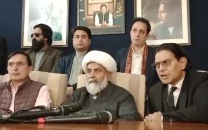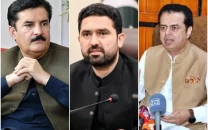Sindh, K-P undecided over insurance programme
Federal govt hopes backdoor diplomacy can convince both provinces

The government has registered around 0.1 million people for its social health insurance programme. PHOTO: AFP
Over 10 months after the launch of the PM’s National Health Insurance Programme, the two provincial governments are still debating whether they are going to be part of the programme.
Health insurance plan — unimplemented
The federal government launched the initiative on December 31, 2015 and the aim was to provide free medical treatment to 3.2 million underprivileged families.
Prime Minister Nawaz Sharif had kicked off the programme from Islamabad. The aim is to provide families earning Rs200 a day, or less, with health facilities of up to Rs300,000-a-year.
About one million families from Sindh and 200,000 from K-P would benefit from the scheme if the provinces sign up.
In the first phase, 23 districts are to benefit from the initiative. Of the total, eight are from K-P and Sindh.
The programme kicked off in eight districts of Punjab, Balochistan, Azad Jammu and Kashmir, and Gilgit-Baltistan. Three more districts will be added to the programme by the end of December, along with two agencies in the Federally Administered Tribal Areas.
The Sindh and K-P governments, however, have yet to give their nod to programme.
Officials in the centre said a presentation about the programme was given to the Sindh chief minister and provincial health officers. He subsequently formed a committee to assess the possibility of joining the federal government’s scheme, but the body has not actually met yet.
K-P launches health insurance for the underprivileged
PM’s Health Insurance Programme Sindh Focal Person Shaista Mubarik said that according to initial estimates, the provincial government will have to contribute Rs1 billion.
“As it’s a big amount, the Sindh government will have to work out whether [such an investment] is feasible or not,” she said.
A committee, headed by the Sindh health minister, was formed to present its report to the provincial cabinet, which has to take the ultimate decision, she added.
Meanwhile, K-P government health officials maintain they have their own health insurance programme.
K-P government spokesperson Mushtaq Ghani maintained that cards for the programme had been made and distributed among deserving families after verification.
About 15 million families will be given treatment facilities, he claimed, and each one will be entitled to treatment amounting to Rs500,000.
Officials at the Federal Ministry for Health said the National Health Insurance Programme cannot start unless the provincial governments pledge financial contributions. They added that 40 to 60 per cent of contributions were made by the federal government, and the provinces needed to cover the rest.
They believed the provinces were delaying approval due to the expenses they would have to incur and for political reasons. The officials also claimed that the provincial governments wanted to avoid giving the federal government an opportunity to take credit for the measure.
State Minister for National Health Services Regulations and Coordination Saira Afzal Tarar acknowledged before a parliamentary committee meeting that Sindh and K-P were not serious about the initiative and were causing delays. They added that the lack of interest and delays on the part of the provincial governments were affecting families who could not afford the expensive treatment for serious diseases.
According to Pakistan Institute of Medical Sciences (Pims) officials, their facility is a tertiary care hospital so patients come for treatment from across the country. They added the highest number of patients come from K-P, including many with minor ailments.
Health officials hoped backdoor diplomacy would convince the provinces, while adding that funds had been allocated for them to join at a later time.
Published in The Express Tribune, November 22nd, 2016.



















COMMENTS
Comments are moderated and generally will be posted if they are on-topic and not abusive.
For more information, please see our Comments FAQ